JISC Research Information Management: CERIF Workshop
Rosemary Russell reports on a two-day workshop on research information management and CERIF held in Bristol over 27-28 June 2012.
A workshop on Research Information Management (RIM) and CERIF was held in Bristol on 27-28 June 2012, organised by the Innovation Support Centre [1] at UKOLN, together with the JISC RIM and RCSI (Repositories and Curation Shared Infrastructure) Programmes. It was a follow-up to the CERIF Tutorial and UK Data Surgery [2] held in Bath in February.
Workshop Scope and Aims
The aim was to bring together people working on the various elements of the UK RIM jigsaw to share experience of using CERIF and explore ways of working together more closely. While the first day focused specifically on RIM, the second day widened to explore synergies with the repositories community. Participants therefore included JISC RIM and MRD projects and programme managers, support and evaluation projects, Research Councils, funders and repository infrastructure projects. There were around 30 participants [3] in total, with some variation across the two days, given the different content. The event was chaired by Josh Brown, RIM Programme Manager and Neil Jacobs, Programme Director, Digital Infrastructure, both at JISC. All presentations as well as breakout session outputs are available via the UKOLN ISC Events site [4].
The New CERIF Support Project at the ISC, UKOLN
The UK community was pleased to welcome Brigitte Jörg [5] to the meeting, in the first week of her new role at UKOLN’s Innovation Support Centre as National Coordinator for the CERIF Support Project. Brigitte is already well known to British practitioners working with CERIF – both in her role as as CERIF Task Group Leader [6] at euroCRIS and as advisor to several existing JISC projects. We look forward to working with her on further initiatives – her CERIF expertise will be a huge asset for Research Information Management support and coordination in British Higher Education.
UK CERIF Landscape
There is certainly extensive RIM-related activity in the UK currently, which looks set to continue. The landscape was outlined in the scene setting sessions by myself, based on the CERIF adoption study [7] carried out earlier this year. The rate of CRIS (Current Research Information System) procurement has increased very rapidly in the last few years, particularly during 2011. For example the first Pure system in the UK was procured jointly by the Universities of Aberdeen and St Andrews in May 2009; now there are 19 UK universities using Pure. Since all CRIS on the market are CERIF-compatible (to a greater or lesser extent) this means that a large number of UK institutions are CERIF users (again, to varying degrees) – around 31% [7]. The two other CERIF CRIS being used in the UK are CONVERIS (Avedas, Germany) and Symplectic Elements (UK-based); only one UK CERIF CRIS is being developed in-house, at the University of Huddersfield. There is therefore a significant potential user base for the many CERIF-based services discussed over the course of the workshop. Particularly as more institutions reach the end of their CRIS implementation phase, they are going to be looking for opportunities to exploit the interchange benefits offered by CERIF.
UK Involvement in euroCRIS and Other International Initiatives
As a reflection of the intensity of UK CRIS activity, the UK has the largest number of institutional members of euroCRIS – 25. The next country in terms of membership is Germany, with just 13 members (and then the Netherlands, with seven). It is also notable that there were six UK papers (up from three in 2010) at the recent euroCRIS conference in Prague (all openly accessible from the euroCRIS website [8]), reflecting the growing UK presence at international level. This indicates the significant impact of JISC programmes - both RIM and MRD (Managing Research Data). At euroCRIS meetings other European countries have expressed some envy of the resources currently available in the UK to support RIM development!
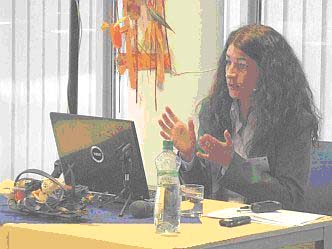
Brigitte Jörg, newly appointed National Coordinator for the CERIF Support Project
Brigitte highlighted some of the current CERIF-related international activities. euroCRIS is a partner in three EU projects: OpenAIRE+ (which has adopted parts of CERIF), ENGAGE and EuroRIS-Net. CASRAI (the Consortia Advancing Standards in Research Administration Information) which is based in Canada, has recently formed strategic partnerships with both euroCRIS and JISC. CASRAI also collaborates with the VIVO project (originally at Cornell University) which has developed an open source ontology and software system. To complete the circle, VIVO and euroCRIS in turn have a strategic partnership. It is interesting that a range of international initiatives are coming together at the same time – coherence across research information internationally is clearly needed by researchers.
HE Data and Information Landscape Report
However Andy Youell from HESA highlighted the lack of coherence in the current UK national landscape: the HE Data and Information Landscape report [9] had just been published the previous week, recommending a governance framework to collectively manage the information landscape. Until now there has been no body to lead across the HE sector on areas such as data standards. Key information and data issues need to be raised out of the ‘nerd space’ to senior management level.
A CERIFied Research Outputs System Launched
Breaking news on the first day of the workshop was the announcement by Dale Heenan of RCUK that a test version of a ‘CERIFied’ Research Outputs System (ROS) [10] had been made available that morning. A demo can be viewed showing CERIF import [11]. The system will also export required research data back to institutions, as part of the two-way process. Live use is planned within several weeks.
With NERC taking the decision to move to ROS, there will shortly be five Research Councils using the system; ROS is also working with Researchfish e-Val in order to make transfer of data as painless as possible. Interestingly, ROS plans to harvest from institutional repositories, which will avoid PIs having to submit individual outputs. ROS staff are working closely with the JISC CERIF in Action (CIA) project. Close parallels with the IRIOS2 project also emerged – both are linking research outputs to grants. A ROS user forum is being set up by ARMA (Association of Research Managers and Administrators UK) to provide informal advice on future development.
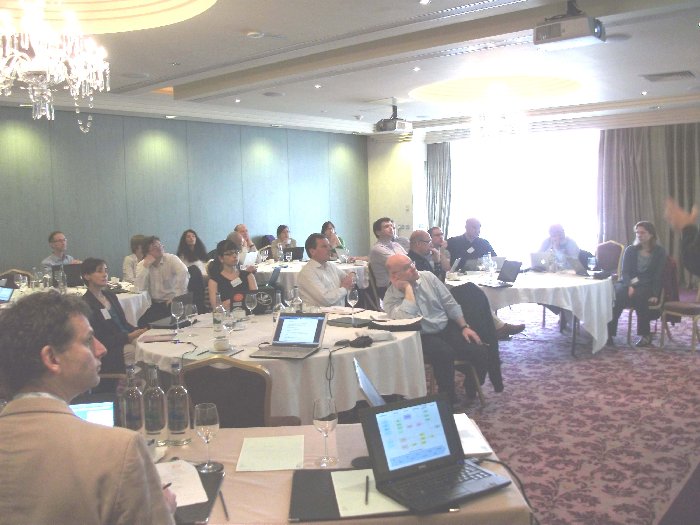
JISC Research Information Management CERIF Workshop
Gateway to Research and Community Development
The Gateway to Research (GtR) [12] has been another exciting CERIF-based development this year, and provides a very public UK endorsement of the standard [13]. It was a big focus for discussion at the workshop. Plans for the GtR were announced by the Department for Business Innovation and Skills in December 2011 as part of the Innovation and Research Strategy [14] which set out the Government’s approach to boosting investment in innovation and enabling UK success in the global economy. David Willetts maintains an interest in the project and Jimmy Wales of Wikipedia is a high profile advisor.
Whereas ROS will be used for institutional input, GtR is designed to provide access to information about research funded by all the Research Councils. A particular aim was to encourage access by SMEs, but it will also serve the general public as well as researchers themselves. The aim is for ‘a seamless join’ between ROS and GtR.
Since data will be sourced from six different Research Council systems (including e-val) with no common ontology, a data dictionary is being developed. An issue discussed was the potential disparity between results from a cross-RC system, and individual systems. A common data model is the key deliverable. The project has been advised to concentrate on making the data available in a standard format (CERIF) and not to worry about the interface – instead prize challenges will be offered to communities for developing applications. The project plans to work with DevCSI at the Innovation Support Centre, UKOLN. As much existing work as possible will therefore be used, to avoid duplicating development elsewhere. Darren Hunter (EPSRC) reported that there is already a lot of engagement with institutions, with many developers enthusiastic about the opportunities. There will also be prize challenges offered for best use of the data provided by GtR. During the GtR breakout session David Shotton suggested the ontology work he is carrying out at Oxford as potentially useful for the project. The GtR system is to be launched at the end of 2013. It is aimed to link to research datasets at a later date.
Identifiers
As might be expected in the context of RIM discussion, the issue of identifiers reared its head again. HESA emphasised the ‘big opportunities’ for person identifiers in particular. The JISC Researcher Identifier Task and Finish Group has recently recommended ORCID as offering the best likely solution to the need for a common UK researcher ID; Verena Weigert of JISC reported on the community consultation just conducted – responses indicated the necessity of researchers being able to see that it benefits them and puts data control into their hands. The prospect of a ‘UK ORCID’ was discussed, alongside the business case. There were some concerns about data security issues – there was a strong preference for a potential system to be based in the UK instead of the US.
JISC will be turning its attention to organisational identifiers next. The workshop agreed that this will be a much more difficult task. Options may range from a formal ontology-based solution, with complex relationships to record eg name changes/mergers etc, or a very simple solution which would just assign new IDs when changes occurred; an alternative is just to adopt an existing identifier eg HESA numeric ID. It was suggested that until you know the purpose for which people need the information, it is difficult to decide what you need to record.
UKRISS: UK Research Information Shared Service
The UKRISS (UK Research Information Shared Service) project is currently conducting a feasibility and scoping study for the reporting of research information at a national level, based on CERIF. Requirements gathering and analysis includes a landscape study and stakeholder interviews. Institutions still managing research on spreadsheets are also included. After scoping the metadata requirements for a national shared service, UKRISS will specify mappings to CERIF.
The second phase will deliver a proof-of-concept solution. The aim is to simplify the gathering of research information in order to reduce the burden of research reporting – as well as enabling improved benchmarking and analysis. This is a key initiative for the UK; Simon Waddington (Project Manager at KCL) also reported from CRIS 2012 that other countries are looking to the UK approach to provide pointers for their own national systems [15].
Project Snowball
Project Snowball [16] is specifically concerned with enabling cross-institutional benchmarking, as described by Anna Clements of the University of St Andrews. It is based on recommendations of the JISC RIM1 project conducted by Imperial College London and Elsevier. A group of eight HE institutions has been working with Elsevier to agree a standard set of metrics to support strategic decision making, as well as methodologies for calculating these metrics. The project has demonstrated the feasibility of scalably inputting data from three sources to generate metrics and benchmarks.
The next stage is to CERIFy – a meeting is planned for September 2012 to take this forward. Also plans are underway for a global standard – institutions also benchmark against overseas counterparts.
Repository Infrastructure
As indicated, repository infrastructure and support projects joined the workshop on the second day, so the programme included a number of repository-related presentations and discussions. In his introduction to the sessions, Neil Jacobs suggested that research management ‘silos’ are starting to work together – data needs to flow between them. Quick wins are needed to demonstrate that the current work is really worth doing (there is also a need to identify what these wins might be).
A key current project is UK RepositoryNet+ (RepNet) [17] which is based at EDINA: ‘a socio-technical infrastructure supporting deposit, curation and exposure of Open Access research literature’. It aims to increase the cost effectiveness of repositories. A range of deposit, reporting and policy tools is already in place. Andrew Dorward suggested that gold OA may happen more quickly than originally expected; alongside the focus on repositories and green OA, RepNet also supports gold OA. A soft launch of RepNet is taking place at Open Repositories 2012 in Edinburgh (July). Transition from project to service is planned to take place in March 2013.
The work being carried out by the RIOXX Project is a key dependency for RepNet. One of the RIOXX outputs is a set of metadata guidelines for repository managers. Paul Walk of the Innovation Support Centre, UKOLN presented some of the guiding principles and options to be used in the guidelines. Primary concerns are how to represent funders and project/grant (it was pointed out in the discussion that project and grant should not be conflated – they are different). Options include using qualified Dublin Core, OpenAIRE 2.0 draft guidelines, or DOIs provide by CrossRef (‘FundRef’) – which could possibly link to GtR. However it was stressed that these are interim guidelines - some aspects are expected to be superseded by a CERIF-based approach. (As noted above, OpenAIRE+ is also adopting parts of CERIF.) A question to be resolved is who should maintain the metadata?
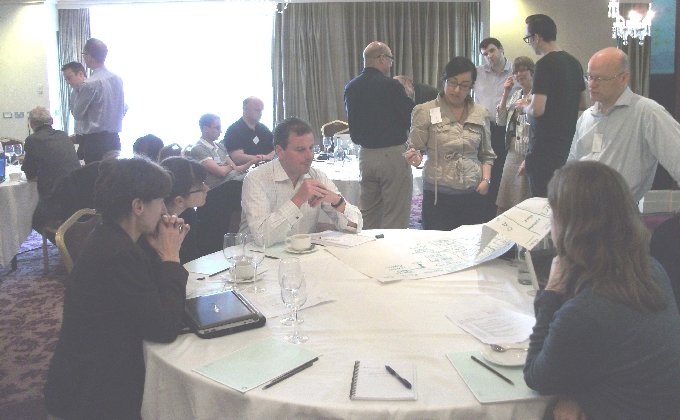
Information flows breakout session: repositories
Breakouts
A range of breakout groups covered topics including:
- managing impact data
- priority vocabularies and authority files
- challenges in managing institutional repositories and CRIS (eg further work is required on data exchange between CRISs and IRs)
- improving inter-project collaboration
- research data (a followup meeting on research data was proposed for later in the year)
- options for maintaining CERIF outputs from JISC projects (proposed that euroCRIS should be responsible for maintaining a schema (initially based on CIA outputs) which other projects could then feed into, on an ongoing basis)
- how to represent the relations between entities (projects, outputs etc) and funding streams (grants etc)
- CERIF for REF
The REF breakout discussion resulted in agreement with HEFCE to develop a CERIF XML template for research groups, staff and outputs submission and to initiate a test pilot for submission (with KCL and the University of Bath – both to be approached). A test pilot will allow valuable learning within a proper framework – import/export of CERIF XML is planned to start in September 2012.
It was suggested that a JISC statement was needed to provide a vision of where UK HE wants to be in relation to CERIF in three years time (eg will it just be accepted underlying technology?)
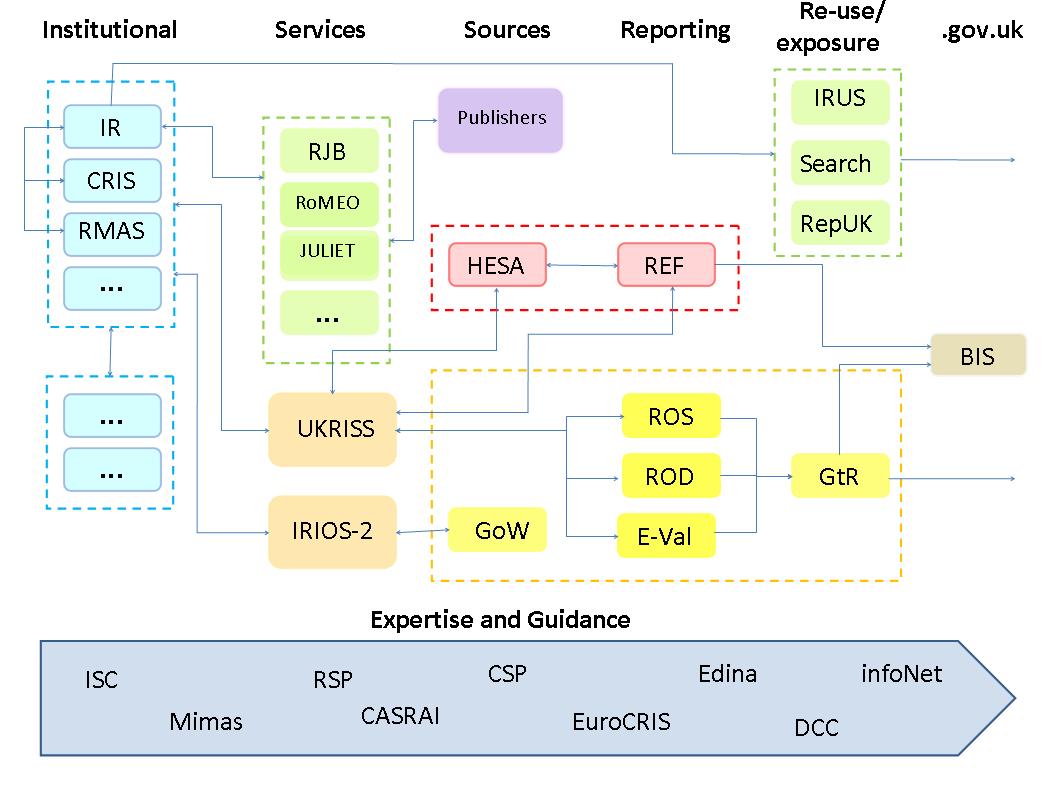
Information flows draft diagram (Josh Brown, JISC)
Another breakout session focused on the information flows draft diagram introduced by Josh Brown. Groups were asked to develop ‘as is’ and ‘to be’ diagrams for the four key areas in the draft: institutions, services, Research Councils and repositories. The group outputs are available [18]. It is planned to synthesise this work to produce a more detailed picture reflecting community views.
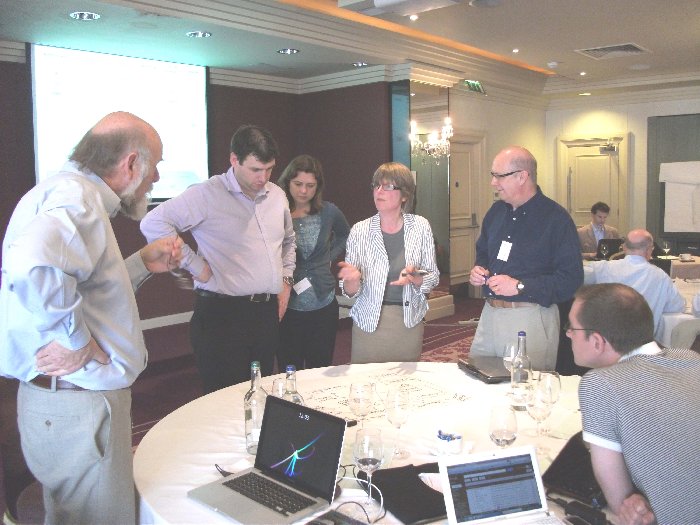
Information flows breakout session: institutions
Conclusion
There is a lot happening in the RIM communities. The CIA project blog commented that the workshop could easily have been extended to four days and still not have covered everything [19]. However many significant RIM-related initiatives were presented and discussed, with ways forward proposed. There is a feeling of momentum, with new work building on projects successfully completed. We are in a much better place than three years ago - CERIF is now firmly embedded in UK HE and real progress is being made in exploiting the data interchange opportunities offered. However there is still a large amount of data duplication. As Josh Brown pointed out, the biggest challenge is RIM harmonisation across all areas - there is a need to communicate and integrate all the work being carried out, also bearing in mind the different levels of maturity (eg in institutional repositories and CRIS). The workshop therefore provides a step towards this goal.
References
- Innovation Support Centre, UKOLN, University of Bath: http://isc.ukoln.ac.uk/
- CERIF Tutorial and UK Data Surgery in Bath, 13 February 2012
http://isc.ukoln.ac.uk/2012/02/13/impressive-turnout-at-cerif-tutorial-and-uk-data-surgery-in-bath/ - JISC Research Information Management: CERIF Workshop: Delegate list
http://www.ukoln.ac.uk/events/rim-cerif-2012-06/#delegate-list - JISC Research Information Management: CERIF Workshop: Programme:
http://www.ukoln.ac.uk/events/rim-cerif-2012-06/programme/ - Brigitte Jörg and the CERIF Support Project, 27 March 2012
http://isc.ukoln.ac.uk/2012/03/27/brigitte-joerg-and-the-cerif-support-project/ - CERIF Task Group http://www.eurocris.org/Index.php?page=taskgroups&t=1
- Innovation Support Centre, UKOLN: Adoption of CERIF in UK HEIs, 15 March 2012
http://isc.ukoln.ac.uk/2012/03/15/adoption-of-cerif-in-uk-heis-report-just-published/ - CRIS 2012 papers: http://www.eurocris.org/Index.php?page=CRIS%202012%20-%20Prague&t=1
- Redesigning the higher education data and information landscape: Project report, June 2012 http://landscape.hesa.ac.uk/
- Research Outputs System: http://www.rcuk.ac.uk/research/Pages/ResearchOutcomesProject.aspx
- Research Outputs System (ROS) CERIF demo (M4V file format)
http://researchoutcomes.rcuk.ac.uk/demo/ros_cerif_opt.m4v - Gateway to Research http://www.rcuk.ac.uk/research/Pages/gtr.aspx
- Innovation Support Centre, UKOLN : Gateway to Research endorses CERIF, 21 June 2012 http://isc.ukoln.ac.uk/2012/06/21/gateway-to-research-endorses-cerif/
- Department for Business, Innovation and Skills, Innovation and Research Strategy for Growth, December 2011 (NB: .pdf format)
http://www.bis.gov.uk/assets/biscore/innovation/docs/i/11-1387-innovation-and-research-strategy-for-growth.pdf - UKRISS poster at CRIS 2012, 18 June 2012 http://ukriss.cerch.kcl.ac.uk/ukriss-poster-at-cris-2012/
- Project Snowball http://www.projectsnowball.info/
- UK RepositoryNet+ : a socio-technical infrastructure supporting deposit, curation and exposure of Open Access research literature http://www.repositorynet.ac.uk/blog/
- JISC Research Information Management: CERIF Workshop: Day 2 Breakout Discussions Morning (11.30-12.30) http://www.ukoln.ac.uk/events/rim-cerif-2012-06/programme/#day2am-breakouts
- CERIF in Action: RIM CERIF Workshop, Bristol 27-28th June 2012: A brief synopsis, 29 June 2012 http://cerifinaction.wordpress.com/2012/06/29/rim-cerif-workshop-bristol-27-28th-june-2012-a-brief-synopsis/
Author Details
Rosemary Russell
Research Officer
Innovation Support Centre
UKOLN
University of Bath
Email: r.russell@ukoln.ac.uk
Web site: http://isc.ukoln.ac.uk/
Rosemary Russell is a Research Officer within the Innovation Support Centre at UKOLN. Her current work focuses on Research Information Management (RIM) and the provision of support and advice for the JISC RIM programme. Rosemary participates in euroCRIS activities and is a member of the Best Practice Task Group. She also has an interest in institutional repository management and the integration of repositories and CRIS.
